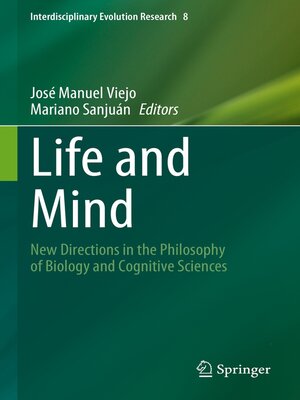Life and Mind
ebook ∣ New Directions in the Philosophy of Biology and Cognitive Sciences · Interdisciplinary Evolution Research
By José Manuel Viejo

Sign up to save your library
With an OverDrive account, you can save your favorite libraries for at-a-glance information about availability. Find out more about OverDrive accounts.
Find this title in Libby, the library reading app by OverDrive.



Search for a digital library with this title
Title found at these libraries:
| Library Name | Distance |
|---|---|
| Loading... |
This volume provides a broad overview of some cutting-edge philosophical topics of growing interest at the juncture between cognitive science and biology. The main goal is not to integrate the variety of approaches into a single account, but rather to offer diverse perspectives on a collection of selected biological issues of particular philosophical relevance, reflecting the plurality of current research in these areas.
Four conceptual vectors give this volume its coherence:
Animal and human cognition: With respect to animal cognition, this volume focuses on self-awareness and methodological flaws in the science of animal consciousness. Regarding human cognition, the authors of this volume address various aspects of so-called 4E cognition. Genetics: The role of genes in the development of mind and life has always been philosophically controversial. In this volume, the authors address the possibility of considering post-genomic genes as natural kinds and the proper analysis of the concept of genotype. Teleology: This volume addresses issues of evolutionary causality and teleosemantics, as well as questions relating to biological teleology and regulation. Evolution: Evolution exemplifies better than any other concept the convergence point between philosophy, biology and cognitive sciences. Among other things, the volume deals with the origin of novelties in evolutionary processes from various viewpoints (e.g., cultural evolution and developmental plasticity). Despite their disparity, all these topics belong to a common naturalistic framework. By presenting them in a single volume, the editors want to emphasize the need to always conduct philosophical research on mind and life with tangential domains in mind.
This book is a valuable resource for students and researchers of philosophy with a special interest in life, cognition, and evolution, as well as for biologists and cognitive scientists.
Four conceptual vectors give this volume its coherence:
This book is a valuable resource for students and researchers of philosophy with a special interest in life, cognition, and evolution, as well as for biologists and cognitive scientists.







